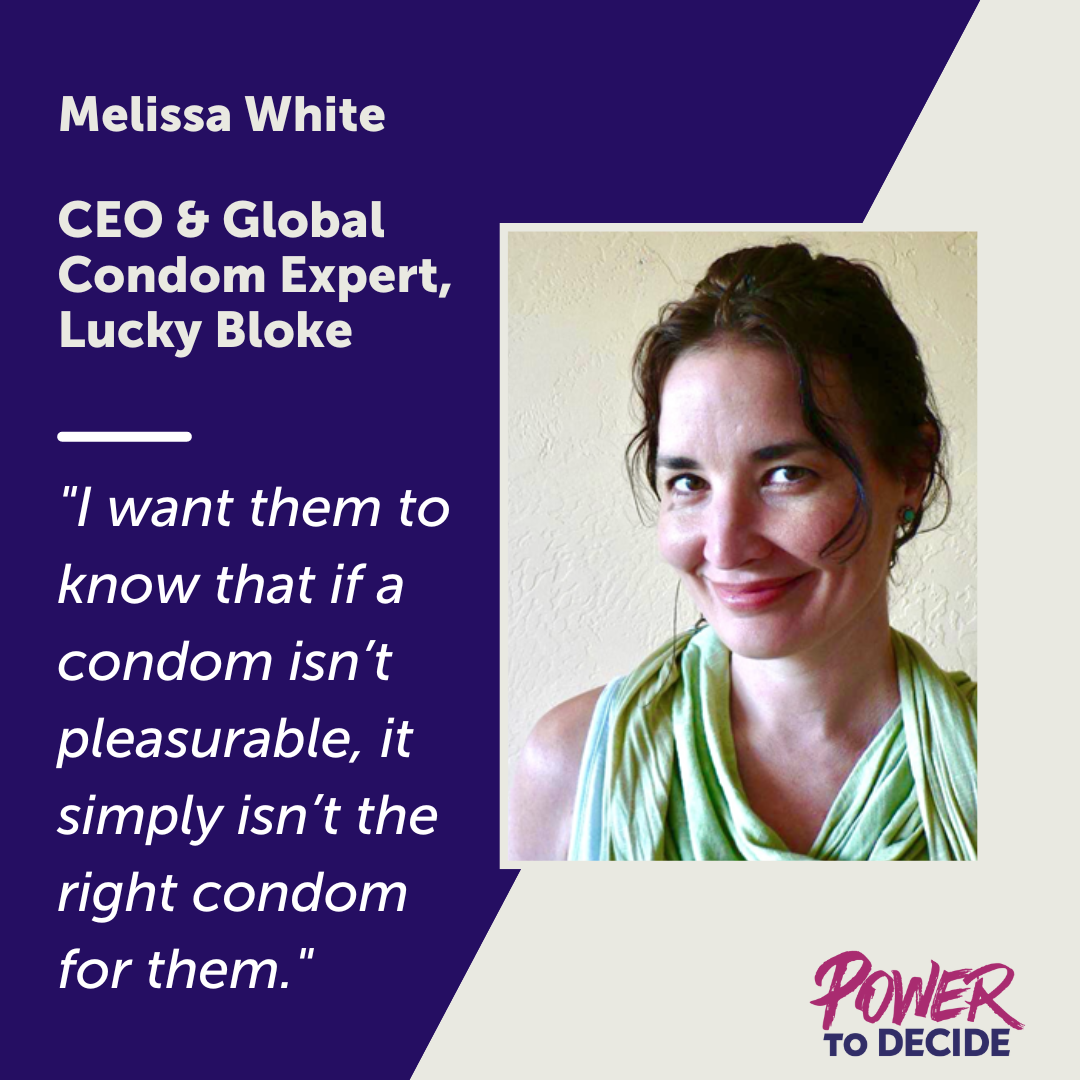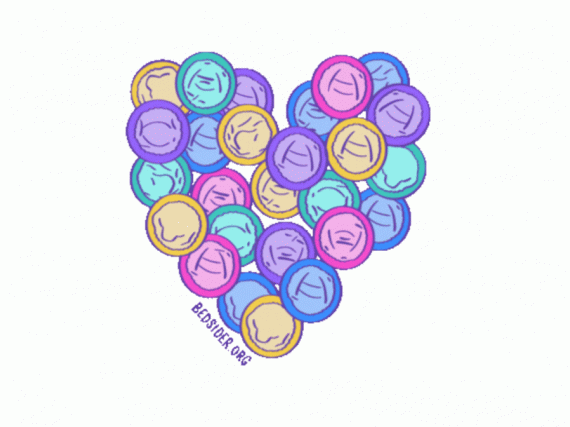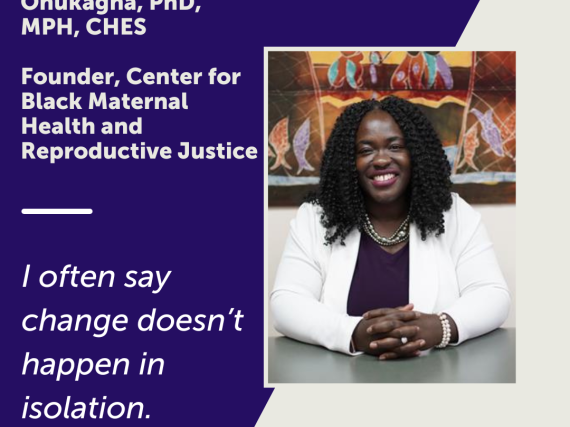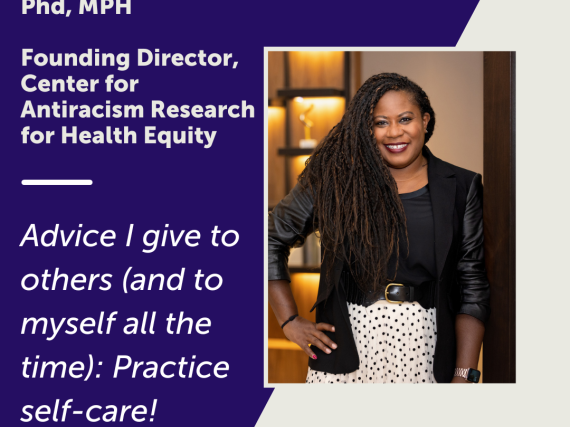August 2023 Power Player
At Power to Decide, we’re committed to uplifting the many individuals on the ground doing the work that matters most. Each month we highlight an individual who is championing the effort to support people’s reproductive well-being. Check out this month's Power Player profile.
Melissa White
CEO & Global Condom Expert, LUCKY BLOKE
What work have you done to ensure that all people have the information and access they need to make decisions that align with their intentions and improve their reproductive well-being?
For too long the narrative has been that condoms haven’t been innovated and this is the reason that people dislike using condoms. That couldn’t be further from the truth. Instead, people haven’t known how to select condoms (or where to find condoms) to fit their bodies. In the US, three mass market brands have owned the shelf space in conventional retail outlets. Thus, most condom users here have never been introduced to the concept of size categories for condoms, nor have they been introduced to innovations from Europe, Asia, Australia, and even newer US brands.
To the average person, condoms were mediocre (at best) and certainly classified as a necessary evil. Typically, whatever first experience a man has had with condoms (too loose, too tight, too thick) would be his lasting impression.
This led me to understand that while people knew they needed to use condoms, they were never taught how to choose condoms. (Or really that there was a choice to be made.) With this critical piece of missing information, I began building Lucky Bloke as a business where empowering and educating about condom fit (and how it related to both safety and pleasure) was our mission.
How did you get started in your field? What is your driving force?
In early 2010, when we first began envisioning how we’d launch Lucky Bloke, our main competitors (brick and mortar retail), offered little brand selection beyond Trojan, Durex, and Lifestyles, and — other than Trojan Magnum — offered no condom sizes beyond standard fit. Online condom retailers appeared more interested in selling mass quantities of the same condoms you could get at your local store at a slightly lower price.
Because 30-35% of men require a condom smaller (narrower/shorter) than the standard condom and 20% of men require a larger (girthier/longer) condom than standard; 45-55% of men in total weren’t being offered a condom that would fit them.
To me, ignoring condom fit and premium brand offerings were shocking oversights. The condom industry is mostly composed of guys. When I asked them why they didn’t offer condoms in varying sizes, I was told “they stretch” or “Men would be too embarrassed to buy a smaller condom even if they needed it, so why bother.” (Could you imagine shoe companies saying they wouldn’t make any shoes for men smaller than a size 11?)
It was no longer a surprise to me why the majority of American men fought condom use. What we found is that across the board, all tended to strongly agree that better condom fit and material significantly increase sensation. Making this finding widely known has the potential to aid in increasing condom acceptance and use, and thus, help to maintain intimate wellness.
What advice do you have for those looking to effect change in the field that you currently work in?
After 12 years, we now have thousands of reviewers and customers in 95 countries! There has been no heed to the rising epidemic of STIs and as I strongly support a person’s right to choose with regard to conception, the critical need for consistently using condoms becomes more important each day.
It is possible that, by continuing this work, it will be commonplace for the entire next generation of condom users to know about condom size and why fit matters. I want them to know that if a condom isn’t pleasurable, it simply isn’t the right condom for them.
Why should someone care about ensuring that all people—regardless of who they are or where they live—have the information and access they need to live their best life?
When I launched Lucky Bloke it was with the personal experience that women needed to negotiate condom use. And often it was with men whose endgame was that we should simply make their lives easier by taking the pill. New relationships would talk you out of needing condoms. “Don’t you trust me? Sure, I’ve been tested.” Monogamous relationships would push birth control pills with the clear understanding that condoms were a problem, and a woman who insisted on using a condom was also a problem.
When I started Lucky Bloke most of my customers were men. There was the assumed gender role and expected social norm that as it was his penis, he needed to bring the condoms. (This obviously did not always result in him bringing a condom though.) At this time women had a curiosity about condoms, but most felt too uncomfortable or uncertain to make an actual condom purchase.
I realized that educating and empowering women to understand condom fit and pleasure would help them to more strategically negotiate condom use. I felt that if I could show women how to choose condoms for their partner that their partner enjoyed, it would be a win-win.
What I have noticed in the last few years is that 50% of our customers are now women. These women are already educated or openly seeking condom education without shame or embarrassment. (Or if embarrassed, it is about knowing so little about condoms.)
Quite regularly, I now hear from women who share that they get a thrill from introducing a new partner to great condoms. I also hear from men about the great girlfriend they had/have who introduced them to Lucky Bloke and condom fit.
Is there a highlight of your work in conjunction with our organization that you’d like to share?
Twitter used to have a policy that banned condom ads that contained (or linked to) any mention of sexual pleasure. But condoms are inherently sexual. How can you — more importantly, why should you — disconnect condoms from sex and pleasure?
In June 2014, we launched a petition demanding that @TwitterAds remove condoms from its blacklist. The results? A show of support from thousands of people and numerous organizations who want to see sexual health messaging promoted, not shamed.
Bedsider came forward sharing their struggles of censorship, speaking out against Twitter’s confusing policy that has excluded them from the platform and in the end, together, we were able to turn the tides. Twitter changed their policy and allowed condoms to be advertised.
Together we stood to put condoms in the public conversation as both a fundamental and pleasurable component to sexual health.



